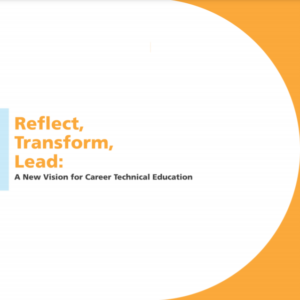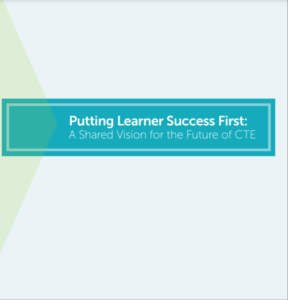The “Getting to Know” blog series will feature the work of State CTE Directors, state and federal policies, innovative programs and new initiatives from the Advance CTE staff. Learn more about each one of these topics and the unique contributions to advancing Career Technical Education (CTE) that Advance CTE’s members work on every day.
 Meet Christina Koch! Christina serves in the role of Policy Associate for Advance CTE. Christina works on projects related to state policy, including the New Skills ready network, initiatives related to Without Limits: A Shared Vision for the Future of Career Technical Education (CTE Without Limits) and supports Advance CTE’s equity initiatives, which currently includes the CTE Learner Voice Shared Solutions Workgroup.
Meet Christina Koch! Christina serves in the role of Policy Associate for Advance CTE. Christina works on projects related to state policy, including the New Skills ready network, initiatives related to Without Limits: A Shared Vision for the Future of Career Technical Education (CTE Without Limits) and supports Advance CTE’s equity initiatives, which currently includes the CTE Learner Voice Shared Solutions Workgroup.
Q: This month, we are sharing resources and best practices for states engaging in Early Postsecondary Opportunities (EPSOs) for learners. How do you define EPSOs?
A: EPSOs include dual enrollment, dual credit, concurrent enrollment and other related opportunities. I would define them as opportunities designed to give each learner a head start on college courses while still in high school to make postsecondary credential and degree attainment easier and more affordable.
Q: How does the shared vision for CTE call for states to create opportunities for each learner to have access to equitable EPSOs?
A: Many aspects of CTE Without Limits focus on removing barriers for learners to reach success in the career of their choice. For example, Principle 2: Each learner feels welcome in, is supported by and has the means to succeed in the career preparation ecosystem, calls for all learners to have equitable access to opportunities so that they can be successful in their career pathways. Increasing equitable access to EPSOs could include making postsecondary credit free to learners and removing grade point average requirements. On the local level, it also means doing targeted outreach to learners from special populations to ensure they are made aware of these opportunities and understand the potential benefits of getting a head start on college courses.
Principle 4 of CTE Without Limits: Each learner’s skills are counted, valued and portable also touches on an important part of ideal ESPOs, in that the credit earned by learners is portable and counted toward their chosen career pathway. It is important that states ensure there are EPSOs available for learners within every career pathway and that credit is easily transferable among public postsecondary institutions.
Q: How are sites that make up the New Skills ready network leading in providing EPSOs?
A: Ensuring that EPSOs are available within every career pathway is definitely a topic of interest among the New Skills ready network sites and some already have really strong initiatives in their states. For example, Nashville, Tennessee is one of the sites in the New Skills ready network and has been expanding their EPSO program for nearly a decade. The state identified EPSOs as one of the most significant ways in which high schools across the state could help prepare learners for postsecondary success and began developing a portfolio of EPSOs. As part of the portfolio approach, all high schools must offer two or more types of EPSOs to ensure that the opportunities are accessible to all high school learners.
Q: Are learners interested in EPSOs? How can states communicate the benefits of EPSOs to increase learner interest?
A: Recent communications research revealed that more than 80 percent of families involved in CTE were satisfied with opportunities to earn college credit and take advanced classes compared to 60 percent or less of families not involved in CTE.
Learners are interested in EPSOs but the challenge is that many do not know that these opportunities are available to them or how to navigate the process of earning postsecondary credit that would be useful to them in their education and career pathway.
New tools and messaging resources are available to help states and local CTE leaders communicate the benefits of EPSOs for secondary learners and recruit families.
Brittany Cannady, Senior Associate Digital Media


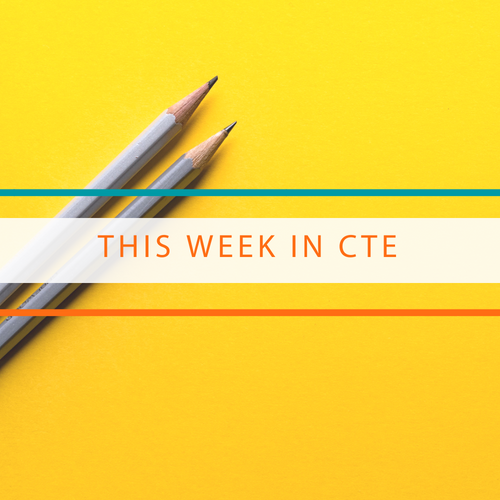 Developed with input from nearly 200 national, state and local education and workforce development leaders and supported by 40 national organizations,
Developed with input from nearly 200 national, state and local education and workforce development leaders and supported by 40 national organizations, 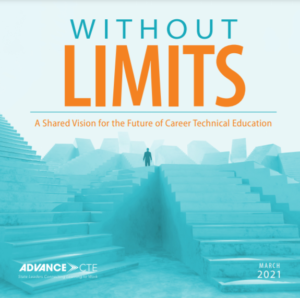
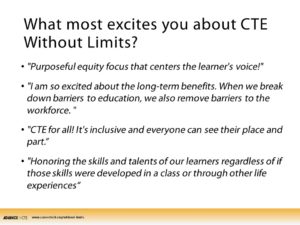 Hearing from members of Advance CTE
Hearing from members of Advance CTE 